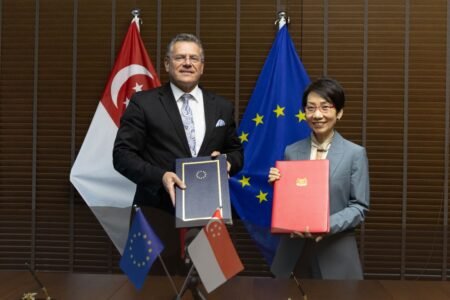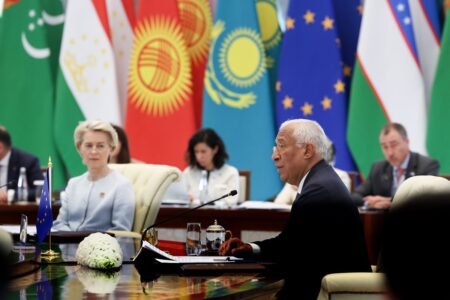The EU has issued a revised import preference scheme – known as the Generalised Scheme of Preferences (GSP) – for developing countries most in need which will take effect from 1 January 2014. Following agreement with the Council and European Parliament, today’s publication contains the specific tariff preferences granted under the GSP in the form of reduced or zero tariff rates and the final criteria for which developing countries will benefit. The new scheme will be focused on fewer beneficiaries (89 countries) to ensure more impact on countries most in need. At the same time, more support is to be provided to countries which the EU sees as serious about implementing international human rights, labour rights and environment and good governance conventions.
Advertisement
The current GSP scheme will remain valid until 1 January 2014, thus giving economic operators time to adapt to the revised regime.
The Council and the European Parliament built on the Commission’s proposal by introducing a wider though limited expansion of products and preferences, a longer transition period for the application of the new GSP, and by expanding specific safeguards to include ethanol and plain textiles.
Which partners are beneficiaries in the reformed GSP?
The new scheme is expected to start with 89 beneficiaries: 49 least developed countries in the Everything But Arms scheme, and 40 other low and lower-middle income partners:
Everything But Arms (49):
33 in Africa (Angola, Burkina Faso, Burundi, Benin, Chad, Congo (Democratic Republic of), Central African (Republic), Djibouti, Eritrea, Ethiopia, Gambia, Guinea, Equatorial Guinea, Guinea-Bissau, Comoros Islands, Liberia, Lesotho, Madagascar, Mali, Mauritania, Malawi, Mozambique, Niger, Rwanda, Sudan, Sierra Leone, Senegal, Somalia, Sao Tome and Principe, Togo, Tanzania, Uganda, Zambia);
10 in Asia (Afghanistan, Bangladesh, Bhutan, Cambodia, Lao (People’s Democratic Republic), Maldives (until end 2013 as they have exited the UN Least Developed Country list), Myanmar/Burma (preferences currently withdrawn), Nepal, Timor-Leste, Yemen);
5 in Australia and Pacific (Kiribati, Samoa, Solomon Islands, Tuvalu, Vanuatu)
1 the Caribbean (Haiti).
These partners will enjoy more opportunities to export as competitors exit the scheme.
Low and lower middle income partners (40):
Armenia, Azerbaijan, Bolivia, China, Cape Verde, Colombia, Cook Islands, Costa Rica, Ecuador, Georgia, Guatemala, Honduras, India, Indonesia, Iran (Islamic Republic of), Iraq, Kirghizia, Marshall (islands), Micronesia (federate States of), Mongolia, Nauru, Nicaragua, Nigeria, Niue, Pakistan, Panama, Paraguay, Peru, the Philippines, El Salvador, Sri Lanka, Syrian (Arab Republic), Tajikistan, Thailand, Congo (Republic of), Tonga, Turkmenistan, the Ukraine, Uzbekistan, Vietnam.
These partners will also enjoy more opportunities to export as competitors exit the scheme.
Which countries will no longer benefit?
The main country categories which will no longer benefit from the GSP scheme are as follows:
33 overseas countries and territories. These are mainly EU territories which have their own market access regulationand thus do not use GSP to enter the EU. Reform will be in general neutral for them. This is the case for:
Anguilla, Netherlands Antilles, Antarctica, American Samoa, Aruba, Bermuda, Bouvet Island, Cocos Islands, Christmas Islands, Falkland Islands, Gibraltar, Greenland, South Georgia and South Sandwich Islands, Guam, Heard Island and McDonald Islands, British Indian Ocean Territory, Cayman Islands, Northern Mariana Islands, Montserrat, New Caledonia, Norfolk Island, French Polynesia, St Pierre and Miquelon, Pitcairn, Saint Helena, Turks and Caicos Islands, French Southern Territories, Tokelau, United States Minor Outlying Islands, Virgin Islands British, Virgin Islands- US, Wallis and Futuna, Mayotte.
34 countries which enjoy another trade arrangement with the EU which provides substantially equivalent coverage as compared to GSP. This includes countries with a Free Trade Agreement or with autonomous arrangements (such as the Market Access Regulation for countries with an Economic Partnership Agreement (EPA) or the special regime for Western Balkan countries). Given that use of GSP is marginal for these countries, reform will in general be neutral for them. This is the case for:
Euromed (6): Algeria, Egypt, Jordan, Lebanon, Morocco, Tunisia
Cariforum (14): Belize, St. Kitts and Nevis, Bahamas, Dominican Republic, Antigua and Barbuda, Dominica, Jamaica, Saint Lucia, Saint-Vincent and the Grenadines, Barbados, Trinidad and Tobago, Grenada, Guyana, Surinam
Eastern Southern Africa (3): Seychelles, Mauritius, Zimbabwe
Pacific (1): Papua New Guinea
Economic Partnership Agreement Market Access Regulation (8): Côte d’Ivoire, Ghana, Cameroon, Kenya, Namibia, Botswana, Swaziland, Fiji
Other (2): Mexico, South Africa
Countries which have been listed by the World Bank as high or upper middle income economies for the past three years, based on Gross National Income (GNI) per capita. These are:
8 high-income partners (Saudi Arabia, Kuwait, Bahrain, Qatar, United Arab Emirates, Oman, Brunei Darussalam; Macao) and
12 upper-middle income partners (Argentina, Brazil, Cuba, Uruguay, Venezuela; Belarus, Russia, Kazakhstan; Gabon, Libya, Malaysia, Palau).
Some limited drops in exports (typically in the 1% range) are expected for many of these partners. Even marginal drops in exports by more advanced, bigger economies, can potentially provide significant opportunities for the poorest, whose exports are very small in comparison. To give an idea of the order or magnitude, a drop of 1% in, say, Brazilian exports, is equivalent to more than 16 times Burkina Faso’s total exports to the EU.
Countries in the second and third category remain “eligible”, but are no longer “beneficiaries” of the GSP scheme. This means that in case their situation changes (if they are no longer listed as high or middle upper income countries by the World Bank or if their trade arrangement expires) they become beneficiaries of the scheme again.
How have products and preference margins been expanded?
Product coverage under standard GSP is already very high: 66% of tariff lines. If we add the 25% of other lines which are already at 0% normal duty, only 9% of tariff lines are today outside GSP. For EBA, all products but arms receive duty-free, quota-free access already. This underlines the generosity of the EU’s GSP.
The new GSP incorporates a wider though limited expansion in products and preference margins for 23 tariff lines, mainly dealing with raw materials (see annex for a list). These products have been carefully selected to avoid negative impacts on the poorest (LDCs), which already have duty free, quota free access for all products.
Background
In 2011, imports that received GSP preferences were worth 87 billion, which represents around 5% of total EU imports and 11% of the total EU imports from developing countries.
Products which have been incorporated into the new GSP from
1 January 2014
GSP: New tariff lines benefiting from preferences (duty free)
GSP: New tariff lines benefiting from preferences (duty free)
CN code | Description |
280519 | Alkali/alkaline-earth metals other than sodium & calcium |
280530 | Rare-earth metals, scandium & yttrium, whether/not intermixed/interalloyed |
281820 | Aluminium oxide (excl. artificial corundum) |
310221 | Ammonium sulphate |
310240 | Mixtures of ammonium nitrate with calcium carbonate/other inorganic non-fertilising substance |
310250 | Sodium nitrate |
310260 | Double salts & mixtures of calcium nitrate & ammonium nitrate |
320120 | Wattle extract |
780199 | Unwrought lead other than refined, n.e.s. in 78.01 |
810194 | Unwrought tungsten (wolfram), incl. bars & rods obt. simply by sintering |
810411 | Unwrought magnesium, containing at least 99.8% by weight of magnesium |
810419 | Unwrought magnesium (excl. of 8104.11) |
810720 | Unwrought cadmium; powders |
810820 | Unwrought titanium; powders |
810830 | Titanium waste & scrap |
GSP: Tariff lines which were subject to duty reduction and will be duty free
CN code | Description |
06031200
| Fresh Cut Carnations And Buds, Of A Kind Suitable For Bouquets Or For Ornamental Purposes |
24011060 | Sun-Cured Oriental Type Tobacco, Unstemmed Or Unstripped |
39076020 | Pol “Ethylene Terephthalate”, In Primary Forms, Having A Viscosity Number Of >= 78 Ml/G”) |
85219000 | Video Recording Or Reproducing Apparatus (Excl. Magnetic Tape-Type);Video Recording Or Reproducing Apparatus, Whether Or Not Incorporating A Video Tuner (Excl. Magnetic Tape-Type And Video Camera Recorders) |
GSP+: New tariff lines benefiting from preferences (duty free)
CN code | Description |
280519 | Alkali/alkaline-earth metals other than sodium & calcium |
280530 | Rare-earth metals, scandium & yttrium, whether/not intermixed/interalloyed |
281820 | Aluminium oxide (excl. artificial corundum) |
780199 | Unwrought lead other than refined, n.e.s. in 78.01 |
For more information
Complete text of the proposal of the new GSP regulation
Source: European Commission







